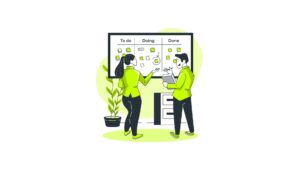Accept Cookies & Privacy Policy?
We use cookies to ensure that we give you the best experience on our website. If you continue to use this site we will assume that you accept and understand our Privacy Policy, and our Terms of Service.
Over the recent years, it’s evident that software development has significantly evolved and outgrown itself quite massively, bringing up some expected and complementary advances in the testing field. Other than a relentless marketing drive towards DevOps, some NexGen modern software developers are now certainly looking towards taking QA testing automation to its very next level. And that’s where precisely artificial intelligence (AI) comes to light.
The primary goal and whole point of a good QA are assuring clients in creating products that meet the market standardizations and requirements. Setting up a benchmark of sorts. And that’s a crucial piece to the puzzle to survive every thriving industry out there.
Deploying intelligent, iterative self-learning systems to identify patterns and features from statistically collected data sets and test cases.
Each time an AI-powered QA system completes a successful round of data processing, it meticulously analyzes the software performance by deploying algorithms emulating a mechanism that’s similar to a human’s learning brain while accounting for and developing an internal and added experience and expertise.
Before we deep sea dive, it is IMPERATIVE to note that AI cannot function as an INDEPENDENT one in all solution. Contrary to all commonplace misconceptions, this tech doesn’t work all by itself yet, so it can’t definitely fully assume the roles of all the previously erstwhile available testing tools. Hence its primary need and application in QA testing, for now, is to significantly improve the QA process orientation by somewhat enhancing the existing functionalities of standardized conventional testing tools.
Traditional standardized testing tools have revolutionized and reformed the present QA testing process in more ways than others. These include automating repetitive and monotonic test cases, detecting and logging in bugs, and gathering statistical data on self-work and decision-making protocols. However, these still have many perilous limitations that significantly and overall undermine the effort mechanism to automate QA testing fully.
When using these conventional testing tools, architects and testers must do all the configurations manually. That involves developing test suites and generating test data to use with the tests. Manual handling of this step is time-consuming and increases the risk of errors – and that’s where AI precisely steps in.
In QA, AI owns the responsibility of configuring testing tools and controlling or overlooking its performance during systemic test runs. This technology also analyzes and
creates detailed study data reports of the entire process – quite the same way a human would study, analyze system performance, and provide a data report.
Nexgen software developers leverage AI trespassing the limitations of traditional QA testing tools to simply speed up the QA testing process. The available tech helps testers automatically generate test suites, quickly analyze software outputs and detect bugs/errors, and log defects that weren’t easy to identify with traditional test run-ins.
Thought Frameworks is a U.S. based QA testing organization that’s been leading in the QA business since 2009, armed with the ultimate solutions for all your software OA testing challenges. We have headquarters both in California, USA, and a fully functional well equipped QA Test Lab in Bengaluru-India, delivering premium QA and QC services endlessly across different domains. An ISTQB Partnered Company, our superhuman test team heroes have delivered numerous QA and QC projects across the globe.

Let’s talk about GenAI and testing in 2025—the wild west of technology where machines are not just smart, but scary smart. GenAI (that’s Generative AI for the uninitiated) is running the show everywhere. It’s writing poetry, designing ads, debugging code, and probably plotting to take over my job as I write this blog.

Ah, 2024—you’ve been a year, haven’t you? For us at Thought Frameworks, this year wasn’t just about running the usual QA/QE playbook. Nope, we went full throttle into the future—tinkering, testing, and transforming everything from ERP systems to the ever-evolving world of SAP, GenAI, and security testing.

So, you’re deep in the ERP trenches and trying to figure out the best approach between NetSuite and Oracle EBS. You’re certainly not alone! We can help break down how these two ERP giants stack up when it comes to ensuring systems run like clockwork but without the overload.

So picture this: You’re the air traffic controller of a chaotic airport where the planes (developers) don’t always listen, the passengers (stakeholders) want to change destinations mid-flight, and the weather (unforeseen blockers) is always unpredictable.

Imagine a world where testing is no longer a bottleneck. No more endless cycles of manual effort, no more missed defects due to human fatigue, and no more panic at the eleventh hour before a major ERP rollout.

Imagine a world where testing is no longer a bottleneck. No more endless cycles of manual effort, no more missed defects due to human fatigue, and no more panic at the eleventh hour before a major ERP rollout.

Let’s talk about GenAI and testing in 2025—the wild west of technology where machines are not just smart, but scary smart. GenAI (that’s Generative AI for the uninitiated) is running the show everywhere. It’s writing poetry, designing ads, debugging code, and probably plotting to take over my job as I write this blog.

Ah, 2024—you’ve been a year, haven’t you? For us at Thought Frameworks, this year wasn’t just about running the usual QA/QE playbook. Nope, we went full throttle into the future—tinkering, testing, and transforming everything from ERP systems to the ever-evolving world of SAP, GenAI, and security testing.

So, you’re deep in the ERP trenches and trying to figure out the best approach between NetSuite and Oracle EBS. You’re certainly not alone! We can help break down how these two ERP giants stack up when it comes to ensuring systems run like clockwork but without the overload.

So picture this: You’re the air traffic controller of a chaotic airport where the planes (developers) don’t always listen, the passengers (stakeholders) want to change destinations mid-flight, and the weather (unforeseen blockers) is always unpredictable.

Imagine a world where testing is no longer a bottleneck. No more endless cycles of manual effort, no more missed defects due to human fatigue, and no more panic at the eleventh hour before a major ERP rollout.

Imagine a world where testing is no longer a bottleneck. No more endless cycles of manual effort, no more missed defects due to human fatigue, and no more panic at the eleventh hour before a major ERP rollout.
Accept Cookies & Privacy Policy?
We use cookies to ensure that we give you the best experience on our website. If you continue to use this site we will assume that you accept and understand our Privacy Policy, and our Terms of Service.
| Cookie | Duration | Description |
|---|---|---|
| cookielawinfo-checkbox-analytics | 11 months | This cookie is set by GDPR Cookie Consent plugin. The cookie is used to store the user consent for the cookies in the category "Analytics". |
| cookielawinfo-checkbox-functional | 11 months | The cookie is set by GDPR cookie consent to record the user consent for the cookies in the category "Functional". |
| cookielawinfo-checkbox-necessary | 11 months | This cookie is set by GDPR Cookie Consent plugin. The cookies is used to store the user consent for the cookies in the category "Necessary". |
| cookielawinfo-checkbox-others | 11 months | This cookie is set by GDPR Cookie Consent plugin. The cookie is used to store the user consent for the cookies in the category "Other. |
| cookielawinfo-checkbox-performance | 11 months | This cookie is set by GDPR Cookie Consent plugin. The cookie is used to store the user consent for the cookies in the category "Performance". |
| viewed_cookie_policy | 11 months | The cookie is set by the GDPR Cookie Consent plugin and is used to store whether or not user has consented to the use of cookies. It does not store any personal data. |
Ready for a Quality Software?
Let’s Dig Deep Into Your Thought!